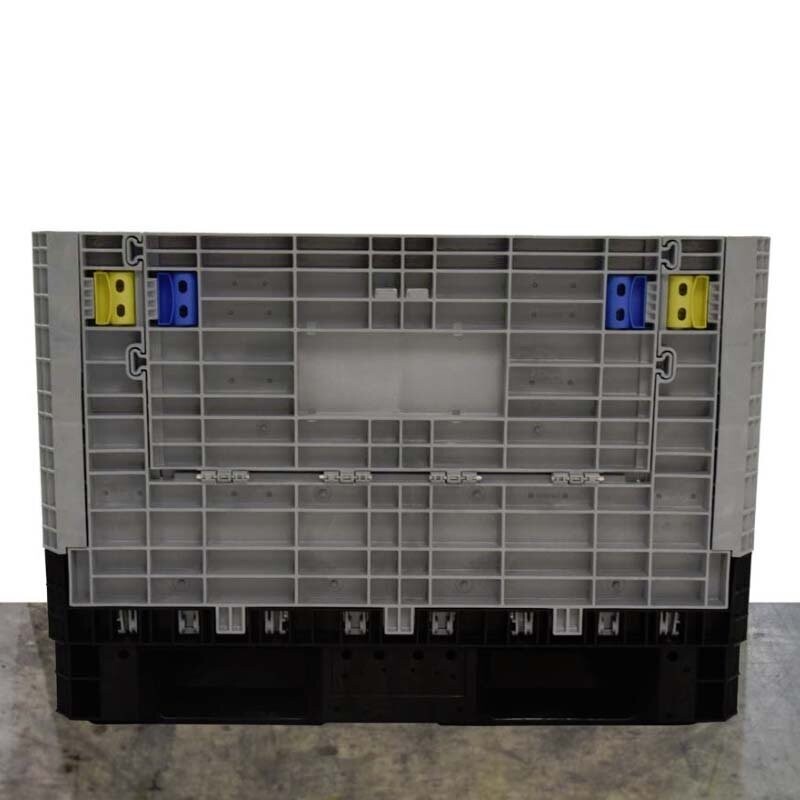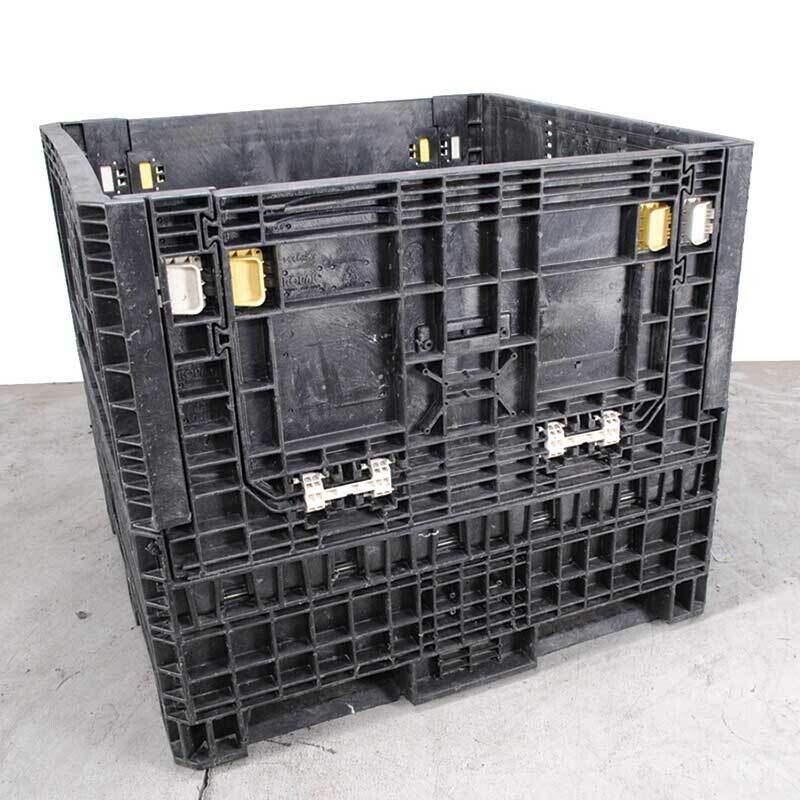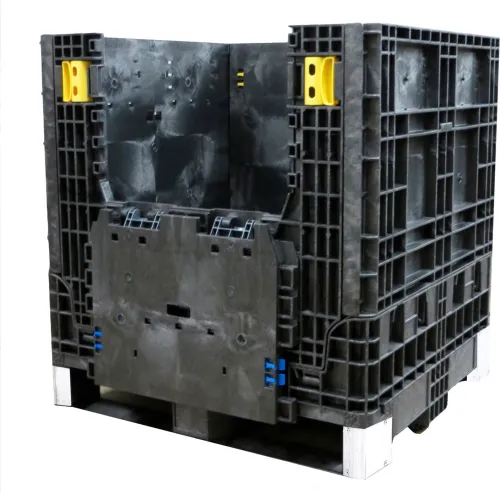Why Bulk Containers Are Important for Lasting and Cost-efficient Transportation
Bulk containers play a crucial duty in modern-day logistics. They assist in the reliable activity of huge quantities of goods, consequently enhancing transportation processes. This method not just decreases prices yet additionally decreases ecological effect via reduced exhausts and waste generation. As sectors look for even more sustainable practices, the adoption of mass containers is becoming progressively considerable. What ramifications does this shift hold for future logistics and supply chain administration?

The Advantages of Making Use Of Bulk Containers in Logistics
Mass containers reinvent logistics by improving efficiency and sustainability. These containers enable for the transport of huge amounts of goods in a single trip, significantly reducing the number of journeys needed. This not only enhances procedures yet additionally decreases labor costs linked with handling, packing, and discharging. On top of that, bulk containers are made to optimize room use within transportation lorries, ensuring that more products can be delivered concurrently.
The standardization of bulk containers also simplifies the logistics process. With consistent measurements, they can be conveniently piled and stored, causing improved storage facility management. Mass containers often feature long lasting products that shield materials from damages throughout transit, thereby lowering product loss and boosting overall dependability. Consequently, services can experience boosted supply chain efficiency, ultimately resulting in increased success and consumer fulfillment. This combination of aspects makes mass containers an important property in modern-day logistics.
Environmental Impact: Minimizing Waste and Carbon Footprint
As industries increasingly prioritize sustainability, the adoption of mass containers has actually arised as a crucial approach for reducing waste and lowering carbon impacts. These containers lessen making use of product packaging products, such as boxes and plastic, thereby notably decreasing total waste generation. By combining deliveries, mass containers enhance transportation efficiency, enabling more items to be transferred per journey. This reduction in journeys straight correlates with lower greenhouse gas emissions, adding to a smaller sized carbon impact.
Furthermore, mass containers can frequently be reused or recycled, better minimizing ecological impact. The longevity of these containers assurances they can withstand multiple transportation cycles, decreasing the requirement for single-use alternatives. used plastic containers. By simplifying logistics and promoting reliable resource usage, mass containers not just sustain lasting practices but likewise motivate sectors to straighten with worldwide ecological objectives. Inevitably, their execution mirrors a dedication to eco-friendly stewardship and responsible source monitoring
Expense Cost Savings: Just How Mass Containers Lower Transport Expenditures
While numerous business seek methods to improve their bottom line, making use of mass containers presents a significant possibility for lowering transport costs. Bulk containers optimize the volume of items moved, enabling businesses to ship larger amounts simultaneously. This efficiency reduces the variety of trips called for, directly decreasing gas prices and decreasing labor expenses connected with loading and dumping.
In addition, mass containers frequently feature streamlined layouts that maximize area application within transport lorries. This implies fewer empty areas, leading to extra efficient use of offered capability. The sturdiness of mass containers can lower the risk of item damages throughout transportation, reducing losses and making sure that more products show up undamaged.
Enhancing Supply Chain Performance With Bulk Storage Space Solutions
Bulk storage services play an important role in boosting supply chain performance by maximizing inventory monitoring. By settling products right into fewer, bigger containers, businesses can significantly minimize handling costs connected with constant transfers and processing. This streamlined technique enables better tracking and monitoring of inventory, ultimately leading to boosted functional efficiency.
Streamlined Supply Administration
Effective stock management is essential for optimizing supply chain operations, especially when organizations embrace bulk storage options. These services enable services to preserve greater stock degrees while decreasing the regularity of replenishment. By settling products right into bulk containers, companies can streamline their supply processes, decreasing the intricacy connected with tracking several smaller bundles. This method helps with precise stock matters and enhances projecting precision, permitting even more informed decision-making. On top of that, mass storage space services streamline warehouse organization, making it less complicated to find and access products when required. As an outcome, organizations can achieve an extra effective stock turn over rate, inevitably improving overall supply chain efficiency and reducing the likelihood of stockouts or overstock circumstances.

Lowered Handling Costs
The execution of bulk storage services not only streamlines stock administration yet likewise substantially reduces handling expenses across the supply chain. By settling materials into bulk containers, companies minimize the requirement for constant handling and transfer between different storage space and transportation devices. This approach reduces down on labor prices associated with loading, unloading, and moving smaller bundles. Additionally, mass storage space minimizes the frequency of shipments, bring about reduced transportation costs and decreased fuel usage. As an outcome, services can maximize their logistics operations, enabling for a much more effective allowance of sources. Inevitably, lowered handling costs add to enhanced overall supply chain efficiency, promoting a setting that sustains both sustainability and financial stability.

Convenience of Bulk Containers Across Numerous Industries
Lots of industries have distinctive needs for transport and storage, bulk containers have emerged as a flexible remedy that satisfies a wide variety of demands. These containers, varying from large bins to specialized storage tanks, can fit varied products, consisting of liquids, powders, and granules. In the farming field, mass containers help with the transport of plant foods and grains, while the food and drink sector uses them for active ingredients and ended up items. The chemical sector relies upon bulk containers for securely carrying harmful products, making certain conformity with security guidelines. Additionally, construction companies take advantage of bulk containers for transporting aggregates and other materials. Their adaptability encompasses various settings of transport, including ships, trains, and trucks, boosting logistical effectiveness. This adaptability not only simplifies procedures across different sectors yet likewise promotes sustainability by lowering packaging waste and optimizing area in transportation. Consequently, mass containers play an essential role in modern-day supply chain management.
Future Fads wholesale Container Use and Sustainability
The future of bulk container use is significantly shaped by innovative products development that boosts sustainability. Furthermore, automation in logistics promises to simplify procedures, reducing waste and improving performance. Embracing round economy techniques will additionally transform just how bulk containers are designed, made use of, and recycled, cultivating a much more lasting transportation landscape.
Innovative Products Advancement
As industries progressively focus on sustainability, innovative products advancement wholesale containers emerges as a substantial consider boosting environment-friendly transport solutions. Researchers and makers are discovering naturally degradable plastics, recycled composites, and lightweight steels to lower ecological impact. These products not just decrease waste but likewise enhance gas effectiveness by decreasing the general weight of containers. In addition, developments in wise materials, which can adapt to varying problems, enhance the durability and performance of mass containers. The combination of these cutting-edge materials lines up with circular economic situation concepts, advertising reuse and recycling. As the demand for sustainable practices grows, the advancement of such materials will play a crucial function in forming the future of mass container usage in logistics and transport.
Automation in Logistics
Considerable developments in automation are positioned to change logistics and the usage of bulk containers, boosting sustainability in transport. Automated systems, consisting of drones check here and independent vehicles, are simplifying the movement of bulk containers, decreasing the dependence on standard fuel-powered transportation. These technologies maximize directing and packing processes, reducing empty miles and improving gas performance. In addition, automated inventory management systems enhance monitoring and tracking of bulk containers, ensuring far better resource allotment and lowered waste. The combination of the Web of Things (IoT) allows real-time data analysis, making it possible for aggressive decision-making that lines up with sustainability goals. As automation proceeds to progress, it is expected to drive further innovations wholesale container use, eventually supporting more lasting logistics methods and decreasing the ecological effect of transportation.
Round Economic Situation Practices
Improvements in automation are setting the phase for a more integrated strategy to round economic climate techniques in the domain of bulk container use. As markets progressively embrace sustainability, mass containers are being designed for durability and reusability. This change not just reduces waste however additionally enhances source performance. Companies are adopting approaches such as closed-loop systems, where utilized containers are accumulated, refurbished, and reestablished into the supply chain. Furthermore, clever innovations track container life process, promoting better monitoring and minimizing environmental effect. The cooperation between suppliers, logistics carriers, and end-users is vital in developing standards for sustainable container use. used bulk containers. Future trends indicate an expanding focus on products that are recyclable and eco-friendly, additional strengthening the circular economic situation's principles in bulk transport

Often Asked Concerns
What Products Are Mass Containers Generally Made From?
Mass containers are commonly constructed from long lasting products such as high-density polyethylene, light weight aluminum, steel, and cardboard. These materials give flexibility, defense, and strength, making them appropriate for transferring numerous goods in various industries successfully.
Just how Do I Choose the Right Size Bulk Container?
Selecting the right dimension mass container entails examining the quantity of products to be transferred, considering taking care of equipment compatibility, and evaluating storage area requirements. Correct dimension warranties efficiency in transportation and reduces waste during shipment.
Are Bulk Containers Reusable or Recyclable?
Bulk containers are commonly multiple-use, created for several journeys, enhancing sustainability. Several can likewise be reused, depending on the materials used. Choosing recyclable options even more sustains ecological objectives and minimizes waste in transportation practices.
What Safety Regulations Put On Mass Container Transportation?
Safety laws for mass container transportation consist of conformity with the Division of Transport standards, appropriate labeling of dangerous materials, structural integrity assessments, and adherence to weight limits to guarantee risk-free handling and protect against accidents throughout transportation.
Exactly How Can Services Shift to Using Bulk Containers Properly?
Services can alter to bulk containers by assessing current logistics, educating personnel on handling, buying suitable tools, maximizing stock monitoring, and working together with distributors to ensure compatibility and performance throughout the supply chain.
As industries significantly prioritize sustainability, the fostering of bulk containers has actually emerged as a crucial strategy for minimizing waste and decreasing carbon impacts. By settling materials right into bulk containers, companies can improve their inventory processes, lowering the complexity connected with tracking several smaller sized packages. As industries increasingly prioritize sustainability, cutting-edge products development in bulk containers emerges as a substantial element in enhancing environment-friendly transport solutions. Automated systems, including drones and self-governing automobiles, are simplifying the activity of mass containers, decreasing the dependence on standard fuel-powered transport. In addition, automated inventory administration systems boost tracking and tracking of mass containers, guaranteeing far better resource allowance and lowered waste.